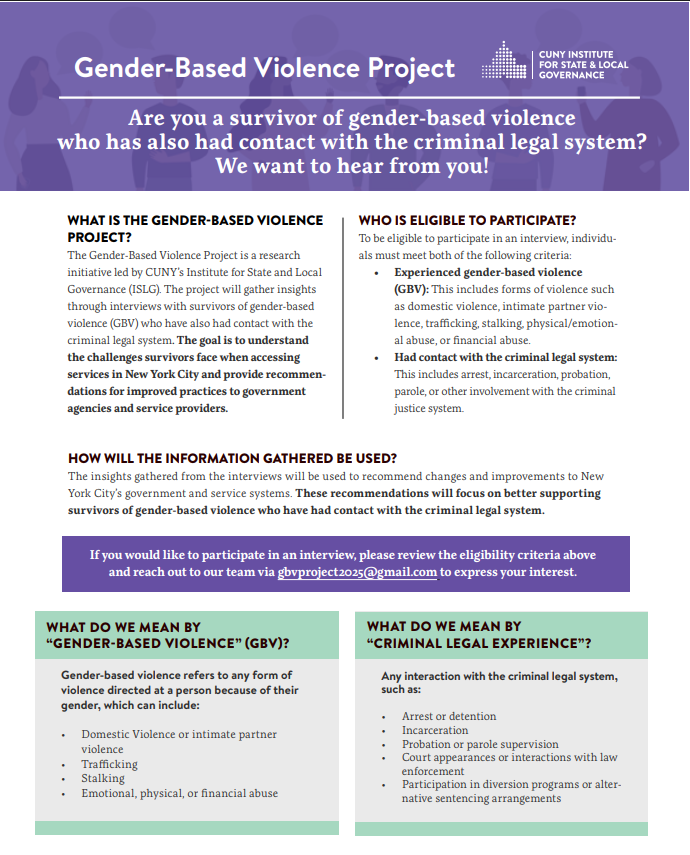CASE STUDY
Better Supporting Criminalized Survivors
LOCATION
New York, NY
location
Optimizing Government & Institutions
ACTIVE
2024-present
By tapping into insights from survivors of gender-based violence who have also had contact with the criminal legal system, this project seeks to better understand the challenges they face when accessing supportive services in New York City—and create solutions.
Challenge:
For many survivors of gender-based violence (GBV), the criminal legal system as designed is not a source of protection or support. Survivors may have been subject to any combination of ongoing violence, trafficking, stalking, sexual assault, emotional and financial abuse, or other forms of GBV. But instead of support, survivors are actually frequently prosecuted for crimes that they were either coerced into committing—drug charges, shoplifting, prostitution—or for defending themselves against the perpetrator of their abuse. The same behaviors and strategies that may have helped them survive while in or escaping violence are the ones that can tie them to the criminal legal system for the rest of their lives. And while this impacts women of every race and ethnicity, both the victimization and criminalization disproportionately affect women of color. Black and Latine women are both incarcerated at higher rates and experience higher rates of violence compared to their white counterparts, including homicide.
The impact of trauma combined with the collateral consequences of criminal legal system involvement requires services to be trauma and culturally responsive. Unfortunately, this is not often the case. Through every interaction, from unnecessary, retraumatizing interviews, to bias and harmful exclusionary criteria of program eligibility - survivors face widespread barriers accessing meaningful services and support.
Approach:
In 2024, with support from the Mayor’s Office of Criminal Justice (MOCJ), CUNY ISLG launched the Criminalized Survivor Project. This project seeks to gather insights from survivors of GBV who have also had contact with the criminal legal system, with the goal of understanding the challenges survivors face when accessing services in New York City.
Through interviews with survivors and community organizations, we aim to understand both the challenges and successes experienced by individuals seeking care and by those providing it. This care includes:
Housing support
Legal assistance
Counseling and mental health services
Health and medical services
Workforce development and education
Domestic violence and crisis intervention
Reentry services
From their insights, CUNY ISLG will provide recommendations for government agencies and service providers to improve their services and delivery to better support this population.
Progress:
We are currently working with our networks and community partners to identify and schedule hour-long interviews with qualified participants. Interviews will be conducted by survivor advocates to ensure a compassionate, trauma-informed environment, and participants will be compensated $50 for their time.
Qualified participants are those who have survived GBV (defined as any form of violence directed at a person because of their gender, which can include: domestic violence or intimate partner violence; trafficking; stalking; emotional, physical, or financial abuse) and has experience with the criminal legal system (which includes any interaction with the criminal legal system, such as: arrest or detention; incarceration; probation or parole supervision; court appearances or interactions with law enforcement; participation in diversion programs or alternative sentencing arrangements).
If you meet the eligibility criteria and want to participate, or if your organization works with individuals who do and you would like to learn more, please contact us at the address below or at gbvproject2025@gmail.com.
Contact Miriam Goodman, at Miriam.Goodman@islg.cuny.edu for more information.


